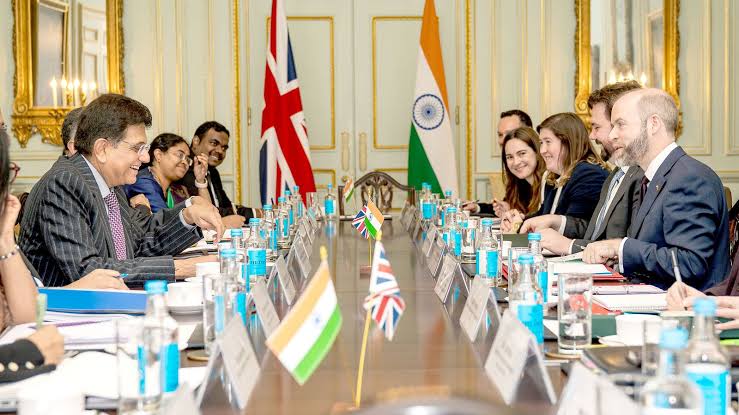The United Kingdom and India have signed a historic free trade agreement, which is being hailed as the largest trade deal for the UK post-Brexit. The deal is set to reduce tariffs on goods like whisky, gin, cars, clothing, and medical equipment, boosting two-way trade and investment. But a key clause addressing double taxation has caused political controversy in the UK.
What is Double Taxation?
Double taxation arises where income is paid twice by two governments or two tiers-hereinbefore illustrated by the taxing of a corporation's profits and then taxing dividends distributed to the shareholders, and taxing an employee's social security contributions in both their host and home nations. International tax agreements and treaties are generally employed to prevent this imposition, providing credits or exemptions to prevent taxing the same income twice.
The Trade Deal’s Double Taxation Clause
One of the most important provisions of the new UK-India trade agreement is the so-called "Double Contributions Convention." In this, short-term Indian workers sent to the UK (and vice versa) will be exempted from contributing to the host nation's social security system for a maximum of three years. This is aimed at preventing workers from being taxed twice on social security contributions while on temporary postings abroad-a step India has welcomed as a "major victory" for its professionals.
Why the Controversy? Opposition MPs and UK critics argue the exemption would render Indian labor less expensive than British labor, particularly following recent increases in employer national insurance contributions. They argue this would undercut local employees and cost the UK Treasury hundreds of millions of pounds. Some, such as Reform UK leader Nigel Farage, argue Indian employees and businesses would be able to pay up to 20% less tax than British employees. The government argues the agreement is business as usual-analogous to agreements with more than 50 other nations-and will apply to only a small number of inter-business transferees.
Business Secretary Jonathan Reynolds had defended the deal, saying, "No one is undercut… We already have similar agreements with many countries." He added that workers will continue to pay income tax and health surcharges and will not get UK social security benefits. The Labour government predicts the deal will add £4.8 billion to the UK economy every year, create jobs, and boost wages.
The Bigger Picture
While the double taxation clause is getting the headlines, the treaty as a whole is expected to boost bilateral trade by £25.5 billion and boost economic ties between the two countries. Both governments are selling the agreement as a move towards closer economic integration of the world, although controversy over its effect on staff and the Treasury is sure to rage on as the agreement approaches final ratification.
Source: BBC News, Bloomberg, Reuters, The Indian Express, Al Jazeera
Source: BBC News, Bloomberg, Reuters, The Indian Express, Al JazeeraThe United Kingdom and India have signed a historic free trade agreement, which is being hailed as the largest trade deal for the UK post-Brexit. The deal is set to reduce tariffs on goods like whisky, gin, cars, clothing, and medical equipment, boosting two-way trade and investment. But a key clause addressing double taxation has caused political controversy in the UK.
What is Double Taxation?
Double taxation arises where income is paid twice by two governments or two tiers-hereinbefore illustrated by the taxing of a corporation's profits and then taxing dividends distributed to the shareholders, and taxing an employee's social security contributions in both their host and home nations. International tax agreements and treaties are generally employed to prevent this imposition, providing credits or exemptions to prevent taxing the same income twice.
The Trade Deal’s Double Taxation Clause
One of the most important provisions of the new UK-India trade agreement is the so-called "Double Contributions Convention." In this, short-term Indian workers sent to the UK (and vice versa) will be exempted from contributing to the host nation's social security system for a maximum of three years. This is aimed at preventing workers from being taxed twice on social security contributions while on temporary postings abroad-a step India has welcomed as a "major victory" for its professionals.
Why the Controversy? Opposition MPs and UK critics argue the exemption would render Indian labor less expensive than British labor, particularly following recent increases in employer national insurance contributions. They argue this would undercut local employees and cost the UK Treasury hundreds of millions of pounds. Some, such as Reform UK leader Nigel Farage, argue Indian employees and businesses would be able to pay up to 20% less tax than British employees. The government argues the agreement is business as usual-analogous to agreements with more than 50 other nations-and will apply to only a small number of inter-business transferees.
Business Secretary Jonathan Reynolds had defended the deal, saying, "No one is undercut… We already have similar agreements with many countries." He added that workers will continue to pay income tax and health surcharges and will not get UK social security benefits. The Labour government predicts the deal will add £4.8 billion to the UK economy every year, create jobs, and boost wages.
The Bigger Picture
While the double taxation clause is getting the headlines, the treaty as a whole is expected to boost bilateral trade by £25.5 billion and boost economic ties between the two countries. Both governments are selling the agreement as a move towards closer economic integration of the world, although controversy over its effect on staff and the Treasury is sure to rage on as the agreement approaches final ratification.
Source: BBC News, Bloomberg, Reuters, The Indian Express, Al Jazeera
